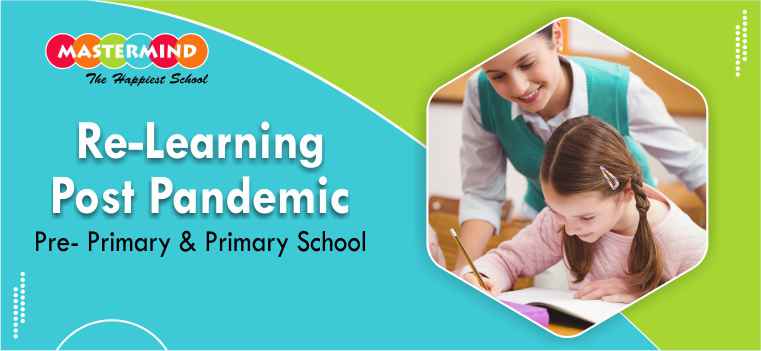Pre-Primary & Primary School - Re-Learning Post Pandemic
Learning Post-Pandemic Is A Challenge For Primary School
The children have been deprived of schooling for two years due to the pandemic. This has had a telling effect on various aspects of not only learning but also on their social behavior and overall personality. Learning post-pandemic is a challenge for primary school. This has opened up several avenues of research for future educationists, social experts, psychologists, counselors etc.
Learning at home has always been emphasized and acknowledged as equally important at school. A conducive learning atmosphere at home has a lot to contribute to a child's success in the academic journey. But since every home is different and the environment is different, the communication between the child and the parents is different. Naturally, the level of learning at home is also different.
The experts have observed that the last two years have adversely affected the children's vocabulary. If not taken care of, it might very well go on to reflect on the ability to understand and express a language with fluency and confidence. It can harm the overall learning of the child, particularly in children in pre-primary and primary school.
A study by Betty Hart & Todd R. Risley concludes that "Eighty-six percent to 98 percent of words recorded in each child"s vocabulary consisted of words recorded in their parents' vocabularies."
This happened because the children were deprived of exposure they would have otherwise gone through if the school days were not missed. Being locked up in their homes limited them to being exposed only to the word being spoken by their parents. Children can listen to a wider range of words from teachers and peers at school.
The study further extrapolated to conclude that "these two years of pandemic and children not going to school has had a great effect on the vocabulary or, to say ultimately, the language learning of the kids, especially between the age of 1 to 3 years.
It is being seen that what a child"s vocabulary would have been at the age of three under normal conditions due to a child has missed out on school for the last two is not being seen even at six years old. We can conclude this two years gap has put the children 3 years behind.
What Action Needs To Be Taken?
A) Role of The Pre-Schools and The Primary Schools?
While the schools will have to plan out lots of oral communication with the kids and the routine syllabus, the plan should have dialogues and not be limited to monologues.
The students will have to be encouraged to re-open and start to speak out. This will certainly be easier said than done because the kids have talked only to their parents in the last two years.
Additional activities that need the child to contribute orally will have to be included in the school curriculum. These could be reading a passage from the book or any other text. A storytelling session, reciting a poem in class, or even cracking a silly joke. These will have to be made regular activities.
The ultimate objective is to talk to the child, make the child talk, listen and use the newer words. This will improve the child's vocabulary and enhance understanding and speed of learning the language. The better the child learns the language and comprehends, the performance in the other subjects will also improve.
Lastly, motivate the parents to become more communicative with their kids and have patience because it will take some precious time before this is back to normal.
B) Role of Parents
As mentioned earlier, the parents have an important role when it comes to the learning of their children.
In the present scenario, when the kids will be back to school almost after two years, the parents will have to be more involved in the entire re-learning process of the kids. They may have to polish their language skills.
The parents’ talk will have to be more constructive with their kids.
The best time would be to start at dinner time. Share the positive things that happened the entire day. Ask the child about their day at school. The kids love to share; you have to start the conversation. This will bring the child close and also allow you to confide in him. They will learn to start a conversation.
They may have to start telling kids stories and encourage them to do so. The best time to do so is before the child goes to bed. A story from the Panchtantra would be great. Do encourage the child also to narrate a story. This will allow the child to think, form sentences and express. Improves comprehension and communication ability.
Reading out passages to their kids and encouraging the child to repeat the action could be another thing that they should be doing.
Conclusion
The last two years have been difficult; this year will be challenging for all the students, the parents, and the school.
The schools that have not been proactive and are yet to prepare themselves for the coming challenges will find it immensely difficult to deliver quality education.
Mastermind School is one of the best primary schools. We have included several activities in our curriculum and practiced it even during the pandemic when we were teaching online.






Speak Your Mind